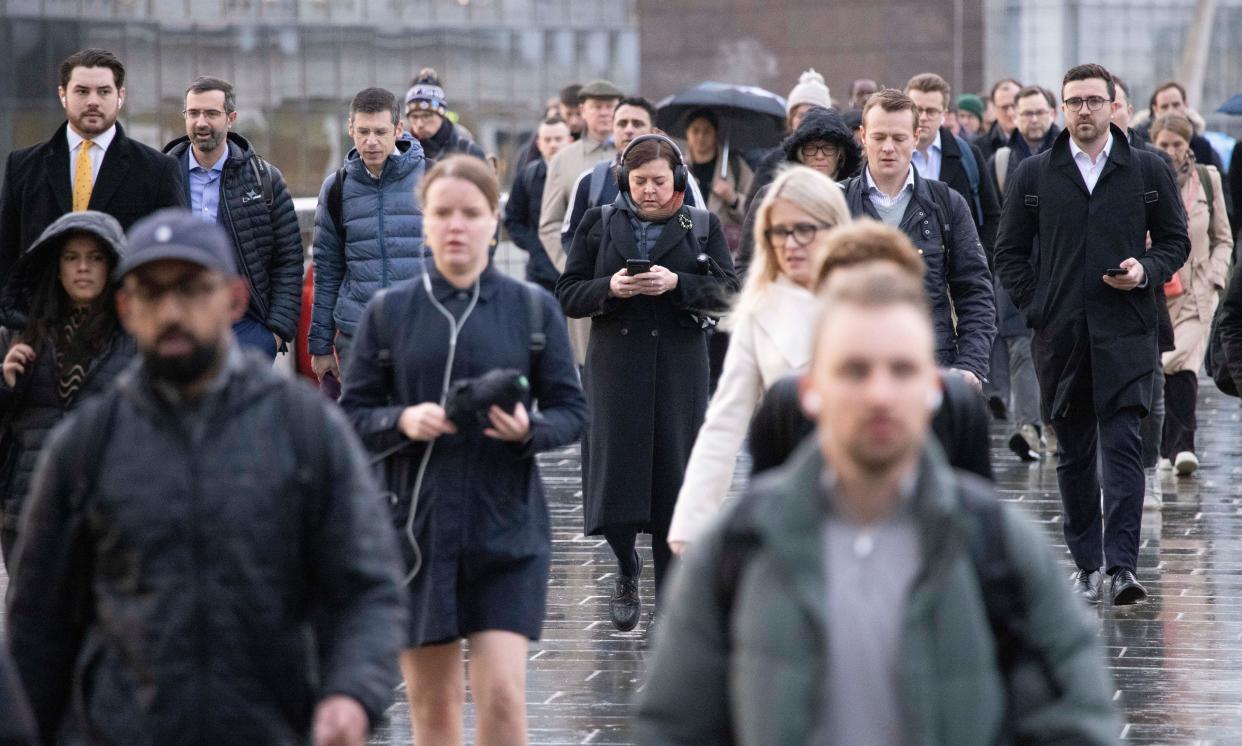UK regular pay rises faster than inflation, easing pressure on living costs

Average wage growth in the UK rose above inflation in August for the first time in almost two years, according to official figures, easing some of the pressure on workers amid the cost of living crisis.
The Office for National Statistics said annual growth in regular pay, excluding bonuses, was 7.8% in the three months to August, among the fastest growth rates on records dating back to 2001.
After a cooling in the annual inflation rate over recent months, the ONS said this meant regular pay was 0.7% higher on the year. Regular pay in the previous three-month period was revised up from an initial reading of zero to 0.1% – the first real-terms increase since October 2021.
Related: Cost of living squeeze eases as UK regular pay rises faster than inflation – business live
Economists expect the ONS to say that annual inflation fell slightly to 6.5% in September, from 6.7% in August, when figures are released on Wednesday – still well above the Bank of England’s 2% target.
However, the latest figures from the labour market showed a sharp drop in job vacancies, with a decrease of 43,000 from April to June to stand at a total of just below 1 million. Employer payroll figures from HMRC also showed there were 11,000 fewer people in employment in September compared with August.
Swati Dhingra, an external member of the Bank’s rate-setting monetary policy committee, said there were signs of the jobs market “really loosening” which could lead to weaker wage growth in future.
Speaking at an event hosted by the Royal Economic Society on Tuesday, she said: “It is hard to imagine where further momentum in wage growth is going to come from.”
With a slowdown in hiring demand as the economy struggles for growth after 14 consecutive rate increases from the central bank, economists expected unemployment to rise and weaker wage growth over the coming months.
Hannah Slaughter, a senior economist at the Resolution Foundation, said: “Following yet another painful squeeze in recent years, pay packets have staged a mini-recovery this year. But with the labour market continuing to cool, the big question going into this autumn is how long this recovery will last.”
Official unemployment figures and other jobs market data will be published next week, after the ONS said on Friday that it needed more timeto take account of low response rates to its main labour force survey.
The Bank left official borrowing costs unchanged at 5.25% last month, up from a record low of 0.1% in December 2021. While financial markets do not expect a resumption in rate rises, the Bank’s chief economist, Huw Pill, warned on Monday that Threadneedle Street still had “work to do” to ensure inflation is brought back under control.
Economists said the Bank’s next rate decision in November was likely to be finely balanced. Dhingra, who has consistently voted to keep rates on hold, said the full impact from earlier rate increases was yet to be felt. “We’re still to see what the effects of that policy are going to be,” she said.
Much of the growth in pay was driven by soaring wage growth in the City of London, where regular pay packets rose by 9.6% for workers in finance and business services. While public sector pay rose by 6.8% on average – the fastest rate since comparable records began in 2001 – it jumped by a much sharper 8% in the private sector.
Workers have also suffered among the worst periods for average wage growth on record over the past decade, after years of sluggish pay rises before the inflation shock triggered after the Covid pandemic and Russia’s invasion of Ukraine.
Total pay growth, including bonuses, rose by 8.1% in the three months to August, with the figure affected by one-off payments made to NHS staff and civil servants to reflect cost of living pressures. After inflation total pay rose by 0.8%.
However, the real-terms value of an average worker’s total weekly pay packet remained almost £30 below the peak recorded in February 2008 before the financial crisis struck.
Jeremy Hunt, the chancellor, said it was good news that inflation was falling and real wages were growing. He added: “To keep this progress, we must stick to our plan to halve inflation.”
Rachel Reeves, the shadow chancellor, said 13 years of Conservative “economic failure” had left working people worse off, with low growth, low pay and high taxes.
She said: “Working people saw pay rise faster under the last Labour government. But with the Conservatives we have seen a decade of stagnant wage growth.”

 Yahoo News
Yahoo News 
